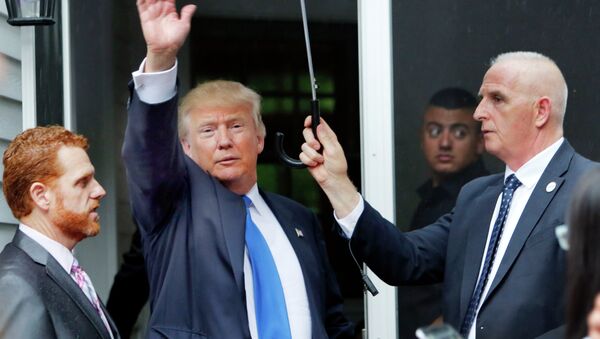"The first thing is going to be the executive orders, memos, letters, directives and all that on immigration that [President Barack] Obama issued. Telling the immigration service to not arrest or deport people is kind of what it amounts to; all that stuff is going to be gone — I think it could even be on the first day," Center for Immigration Studies executive director Mark Krikorian said.
"I think they'll make a big show of it where he signs something that cancels them all," Krikorian added.
Trump, who is to be sworn in as the 45th US president on January 20, has identified immigration as a top priority for his first 100 days in office, along with changes to health care and cutting corporate taxes.
Among other controversial, immigration-related promises Trump made in the campaign was to build a wall along the United States’ southern border and Mexico pay for the construction. But turning that idea into an actual wall may lack the urgency of Trump’s campaign-trail rhetoric, Krikorian believes.
"The problems we have at the border now are not fixed by walls; they're fixed by a different administration in Washington with different policies," he argued. "I think the money can be spent better elsewhere, so to that degree, yes. But it's not like it's some ludicrous idea that's unachievable."
Apprehensions of suspects at the border have increased in the past three months, according to the Department of Homeland Security. In October, a total of 46,195 individuals were apprehended between ports of entry on the southwestern border, up from 39,501 in September and 37,048 in August. An estimated 41,000 people are detained in jails near the border.
Demanding that Mexico’s government pay or reimburse the United States to build a wall might seem a strange idea, but there could be ways to exact funds indirectly, in Krikorian’s view.
"If Mexico didn't pay for it, then they'd do things like increase fees on visas issued in Mexico, put withholding tax on remittances sent to Mexico, that kind of thing," he said, referring to possible moves by Washington.
"The Trump administration can change that on its own. It doesn't need legislation," Krikorian said.
Trump the candidate promised to end the Deferred Action for Childhood Arrivals Act (DACA), championed by President Barack Obama to protect the US-born children of undocumented immigrants, and introduce legislation to stiffen penalties for immigration violations against deportees who attempt to re-enter the United States.
Although Trump's immigration policies appear aggressive, Krikorian does not expect their implementation to unfold in a radical manner.
"Will they send teams of ICE people through the barrio, knocking on doors and rounding people up? No, it's not going to happen," Krikorian said, referring to US Immigration and Customs Enforcement. "Will they increase deportations from what they have now? Yes, absolutely, but it’s not going to be some radical thing."
The Trump administration is also expected to crack down on resettlement of refugees from the Middle East, particularly Syria, out of fear that some asylum applicants could be terrorists.
"I expect they're going to stop refugee resettlement from Middle Eastern countries, at least temporarily, and do some kind of top-to-bottom reassessment," said Krikorian, whose research organization is based in Washington, DC. "They'll probably have much higher levels of scrutiny…from the Middle East."
Trump provided no details for what he has called “extreme vetting” of asylum applicants, but the approach may be aimed at screening people who are nonviolent but disapprove of American values, Krikorian stated.
"The extreme-vetting idea isn't about checking whether somebody's a terrorist — we're doing that now. We may not do it very well, but we're doing that now," he said. "What he was suggesting was to see whether people agree with the basic ground rules of a civilized society. "
The incoming president’s policies have a solid chance of passing, particularly with Republicans maintaining their majorities in the House of Representatives and the Senate, but opposition from some legislators could be significant.
"I think he's going to have a reasonably good chance of passing a lot of these things that there's a lot of agreement on,” according to Krikorian. “The question is whether the Senate would filibuster them because the Democrats — all they need is 40 votes for a filibuster.”
In the border city of El Paso, Texas, Fernando Garcia, founder and executive director of the advocacy group Border Network of Human Rights, said Trump's policy goals have instilled fear among immigrant families in the area.
"It criminalizes immigrants," Garcia said. "It is ridiculous because it seems Mr. Trump and his supporters are forgetting how America was built: immigration and immigrants. They need to recognize that a diverse America is the future."
Already, many families have been split by the Obama administration, which has deported an estimated 2.5 million people, Garcia pointed out.
But Trump's plans to end DACA would dash the hopes of nearly 700,000 young, undocumented Hispanics pursuing an education in US institutions, Garcia stated.
"Essentially he wants to cut a dream, eliminate a dream of these students," Garcia said "They're going to be exposed to deportation. They don't know those countries because they grew up in the United States."
Those and other policies would only add to families being divided and inflict further suffering.
Regarding Trump’s proposed wall, he said such an undertaking would be an enormous financial burden. The US-Mexico border stretches nearly 2,000 miles, and it cost up to $4 million per mile to build and maintain just a fence, let alone a hardened barrier.




